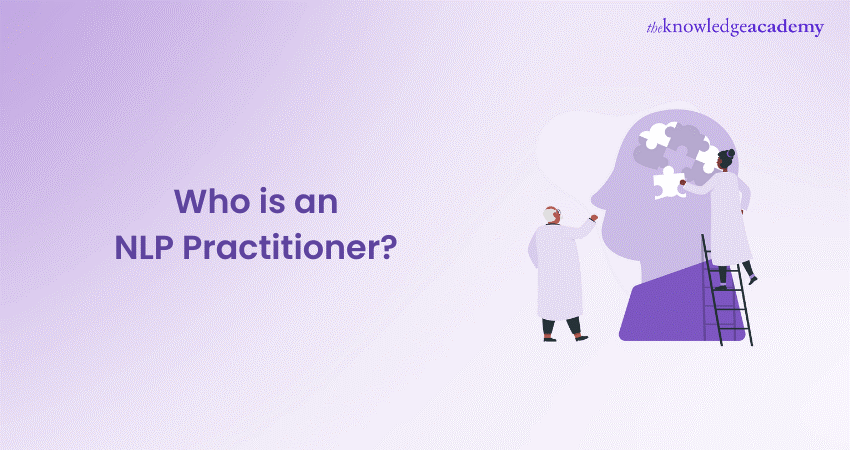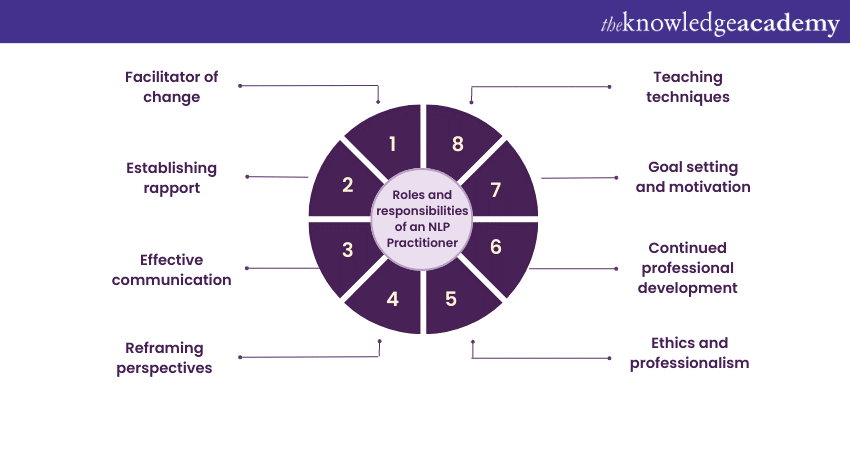We may not have the course you’re looking for. If you enquire or give us a call on +1 7204454674 and speak to our training experts, we may still be able to help with your training requirements.
We ensure quality, budget-alignment, and timely delivery by our expert instructors.

Neuro-Linguistic Programming (NLP) is a powerful and influential approach to human psychology and communication. NLP Practitioners are skilled professionals who specialise in applying NLP techniques to help individuals and organisations achieve personal and professional growth, improve communication skills, overcome limitations, and reach their full potential.
Such practitioners have undergone specialised training in NLP techniques and tools. They utilise their knowledge and skills to help individuals, organisations, and communities grow personally and professionally. Read this blog to learn what an NLP Practitioner does, their roles and responsibilities of an NLP Practitioners, and the skills required to become one. Delve in to learn more!
Table of Contents
1) Who is an NLP Practitioner?
2) How to qualify as an NLP Practitioner?
3) Profile of a typical NLP Practitioner
4) Skills of an NLP Practitioner
5) Roles and responsibilities of an NLP Practitioner
6) How can NLP Practitioners help you?
7) Conclusion
Who is an NLP Practitioner?
An NLP practitioner utilises Neuro-Linguistic Programming (NLP) techniques to support individuals in achieving goals and overcoming challenges. NLP encompasses tools that enhance Communication Skills, relationships, and personal development. Practitioners aid in transforming limiting beliefs, fostering effective communication, goal setting, fear/phobia alleviation, relationship improvement, and enhancing self-esteem.
NLP Practitioners operate in diverse settings, including coaching, therapy, education, and sales/marketing, addressing individual, group, and organisational needs. From coaching for personal growth and treating mental health concerns to applying NLP in educational or business contexts, practitioners play a versatile role in facilitating positive change and improvement.
How to qualify as an NLP Practitioner?
Individuals holding NLP Practitioner Certification can practice globally, as the certification is internationally recognised. These practitioners, akin to coaches, operate in a self-regulated field through reputable organisations like INLPTA, ABNLP, NLPEA, and ANLP. These regulatory bodies establish ethical standards, provide memberships, and oversee NLP professionals' accreditation through recognized training courses.
Certification involves thorough study and course completion, typically spanning 120 to 130 hours. Qualified NLP trainers, authorised by professional bodies, conduct assessments to gauge proficiency. The certification process includes ongoing evaluations and a final test to ensure individuals meet the required skill level.
From Basics to Advanced: Prepare with Top NLP Interview Questions!
Profile of a typical NLP Practitioner
A typical NLP Practitioner embodies a diverse profile, reflecting individuals from varied backgrounds worldwide. Defined more by shared qualities than a specific profile, NLP Practitioners showcase a genuine eagerness to learn, a passion for enhancing the world, and an innate curiosity. These attributes, rather than predetermined qualifications or experiences, distinguish them.
With NLP's universal accessibility, Practitioners hail from all walks of life, contributing to the inclusivity of this field. Success in NLP is less about a predefined profile and more about cultivating a mindset open to continuous learning and positive transformation. As a result, NLP Practitioners become a dynamic and varied community, united by a shared commitment to utilising NLP skills for personal and professional growth.
Skills of an NLP Practitioner
Now that we know the NLP Practitioner meaning, we will move on to exploring the skills they possess. An NLP Practitioner possesses a range of core skills and NLP Techniques that enable them to facilitate personal change and transformation. These skills include:
a) Effective communication: NLP Practitioners are skilled in understanding and utilising verbal and non-verbal communication cues to establish rapport and enhance the effectiveness of their interactions. For those interested in delving deeper into communication, consider exploring Types of Communication Skills and Principles of Communication.
b) Anchoring: NLP Anchoring is a technique that associates specific emotional states with external stimuli. Anchoring involves associating specific emotions or states with sensory stimuli. NLP Practitioners guide individuals in creating and utilising anchors to access resourceful states such as confidence, relaxation, or motivation in different contexts.
c) Reframing: It involves changing the meaning or interpretation of an experience to create a more empowering perspective. NLP Practitioners help individuals reframe their beliefs, thoughts, and past experiences, enabling them to overcome obstacles and achieve their desired outcomes.
d) Rapport building: It is a fundamental skill used by NLP Practitioners to establish trust, understanding, and connection with their clients. Practitioners create a comfortable and supportive environment for personal growth and change through mirroring, matching, and pacing techniques.
Want to transform your life with NLP? Sign up for our NLP Foundation and Practitioner Training Course today!
Roles and responsibilities of an NLP Practitioner
Now, let's explore their roles and responsibilities. Here are some of the key roles and responsibilities of NLP Practitioners:

a) Facilitator of change: Your core duty involves leveraging NLP techniques to facilitate positive transformations, aiding clients in overcoming limitations and achieving desired outcomes.
b) Establishing rapport: Establishing a foundation of trust is paramount. You create a secure space where clients feel at ease exploring their thoughts, emotions, and beliefs.
c) Effective communication: Possessing excellent communication skills, you actively listen, utilise effective language patterns, and interpret non-verbal cues through the NLP Communication Model, fostering enhanced understanding.
d) Reframing perspectives: Guiding individuals in reframing perspectives, you challenge limiting beliefs, enabling clients to overcome obstacles and embrace empowering mindsets.
e) Teaching techniques: Imparting practical NLP techniques such as visualisation, anchoring, and timeline therapy empowers individuals to manage emotions, set goals, and enhance overall well-being.
f) Goal setting and motivation: Steering clients in setting meaningful goals, you provide ongoing motivation and support, facilitating personal and professional growth.
g) Continuous professional development: Committed to your growth, you engage in continuous learning, attending workshops and staying abreast of NLP Outcomes advancements to deliver the highest quality service.
h) Ethical and professional conduct: Upholding ethical standards, maintaining confidentiality, and prioritising clients' well-being demonstrate your commitment to ethical and professional practice.
Take control of your mind and transform your life with NLP by joining our Neuro-Linguistic Programming Courses today!
How can NLP Practitioners help you
Stress is a painful condition that has become very common in today’s world; everyone, from kids to adults, is affected by it. That’s where NLP Strategies comes in. It can significantly improve your behaviour and thought process and will make you resilient in handling stress. Besides, it will also provide various skills for you to improve in many aspects of life.
A balanced life is often the key to success. Whether it's personal or professional, it needs to have a balance. NLP Practitioners guide you in leading a balanced life by improving your skills as well as getting rid of behavioural issues like addictions. So, they can help people in many ways, and getting trained in NLP can also help other professionals, like people working in Healthcare Management.
Ready to stand out in your NLP interview? Prepare with key NLP Interview Questions and Answers to demonstrate your deep understanding of natural language processing techniques.
Conclusion
An NLP Practitioner plays a crucial role in facilitating personal and professional growth by applying Neuro-Linguistic Programming techniques. They possess a range of skills and tools that enable individuals to overcome limitations, enhance communication, achieve goals, and transform their lives. Whether in personal development, business, or therapy, the expertise of an NLP Practitioner can make a significant impact on individuals and communities, often supported by insights found in various NLP books.
Take control of your mind and transform your life with NLP by joining our Neuro-Linguistic Programming Courses today!
Frequently Asked Questions
Can NLP be integrated into existing training programs for employees?

Certainly, NLP can seamlessly integrate into existing training programs for employees. Its versatile techniques enhance communication, leadership, and interpersonal skills, fostering a positive work environment. NLP empowers employees to overcome challenges, improve performance, and achieve personal and professional growth.
How can NLP be used to improve sales and client relationships?

NLP enhances sales and client relationships by improving communication, building rapport, and understanding client needs. Techniques like mirroring and pacing create a connection, while language patterns influence perceptions. NLP empowers sales professionals to adapt strategies, overcome objections, and create positive interactions.
What are the other resources and offers provided by The Knowledge Academy?

The Knowledge Academy takes global learning to new heights, offering over 3,000 online courses across 490+ locations in 190+ countries. This expansive reach ensures accessibility and convenience for learners worldwide.
Alongside our diverse Online Course Catalogue, encompassing 19 major categories, we go the extra mile by providing a plethora of free educational Online Resources like News updates, Blogs, videos, webinars, and interview questions. Tailoring learning experiences further, professionals can maximise value with customisable Course Bundles of TKA.
What are related courses and blogs provided by The Knowledge Academy?

The Knowledge Academy offers various NLP Courses, including NLP Foundation and NLP Master Practitioner. These courses cater to different skill levels, providing comprehensive insights into NLP Dissociation Techniques.
Our Business Skills blogs cover a range of topics related to NLP, offering valuable resources, best practices, and industry insights. Whether you are a beginner or looking to advance your NLP skills, The Knowledge Academy's diverse courses and informative blogs have you covered.
What is the Knowledge pass and how does it work?

The Knowledge Academy’s Knowledge Pass, a prepaid voucher, adds another layer of flexibility, allowing course bookings over a 12-month period. Join us on a journey where education knows no bounds.
Upcoming Business Skills Resources Batches & Dates
Date
 Neuro Linguistic Programming
Neuro Linguistic Programming
Fri 21st Feb 2025
Fri 4th Apr 2025
Fri 6th Jun 2025
Fri 29th Aug 2025
Fri 24th Oct 2025
Fri 26th Dec 2025






 Top Rated Course
Top Rated Course



 If you wish to make any changes to your course, please
If you wish to make any changes to your course, please


